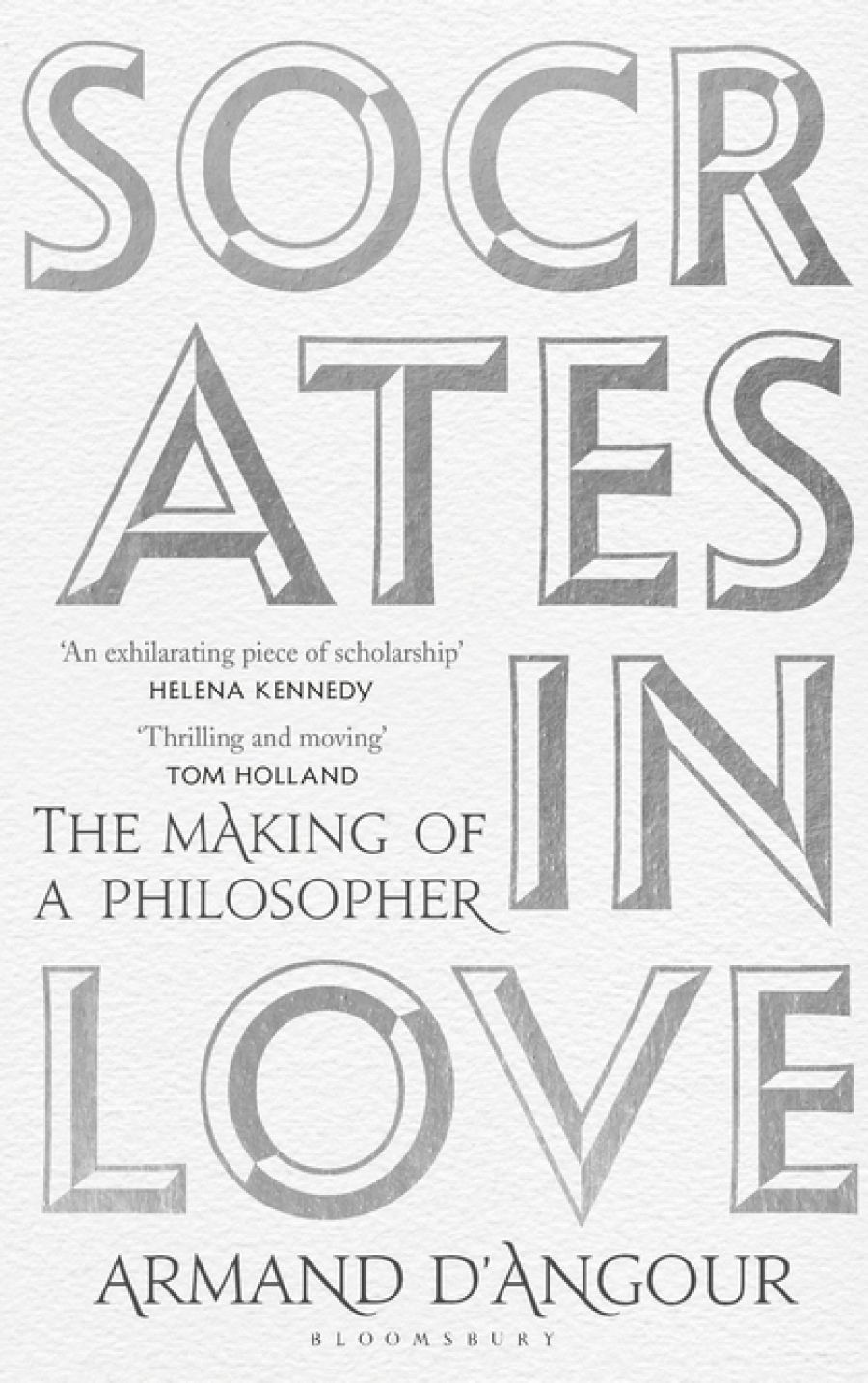
- Free Article: No
- Contents Category: Philosophy
- Custom Article Title: Julia Kindt reviews <em>Socrates in Love: The making of a philosopher</em> by Armand D’Angour
- Custom Highlight Text:
It may be tempting to think we already know Socrates, the Athenian philosopher whose most famous dictum remains that he was wise only insofar as he was aware of his own ignorance. Although Socrates never published anything of his own ...
- Book 1 Title: Socrates in Love
- Book 1 Subtitle: The making of a philosopher
- Book 1 Biblio: Bloomsbury, $34.19 hb, 247 pp, 9781408883907
D’Angour revises our picture of the philosopher. Socrates was not, as is frequently assumed, a member of the lower classes. He grew up in a wealthy and reputable family. At least up to his forties, Socrates was vigorous, physically attractive, and fit; he participated in several important military campaigns of his day. He once even risked his life – and those of fellow fighters – by breaking ranks to rescue the wounded Alcibiades from certain death on the battlefield.
D’Angour’s account of Socrates’s life prior to his philosophical career is speckled with detail illuminating a side with which few will be familiar. We learn that Socrates stood up during the performance of Aristophanes’s Clouds at Athens to out himself as the comedy’s infamous protagonist – and remained standing for the rest of the play. He was married to a woman called Myrto before he wed the fierce Xanthippe. He had three children. He had a habit of stopping in his tracks and standing motionless for hours on end to think things through. Of course, one could be tempted to dismiss this sort of information as entertaining but ultimately inconsequential; yet it raises larger questions concerning the link between the philosopher’s earlier life and his contribution to the later philosophical tradition – questions that give Socratic philosophy a new grounding.
The case the book builds concerns the question of what may have instigated Socrates’s turn away from worldly matters to the path of a thinker and intellectual. D’Angour argues that it was a love affair with Aspasia of Miletus – a beautiful, intelligent, eloquent woman who ended up marrying the famous Athenian statesman Pericles – which eventually turned cold, inspiring Socrates to embrace the idea of ‘Platonic love’ and what came to be known as ‘the Socratic method’ of investigation.
 The Death of Socrates by Jacques-Louis David, 1787 (photograph via Wikimedia Commons)
The Death of Socrates by Jacques-Louis David, 1787 (photograph via Wikimedia Commons)
This is a book about a specific historical person. Yet it also speaks to larger questions concerning the principles and practices of the historical imagination and the challenges we face when trying to reconstruct a life lived millennia ago. As D’Angour provocatively asks, ‘When can a source be trusted to be telling us the historical truth, and when can it not be?’ Even if the author’s historical reconstructions occasionally border on speculative, the general reader will take away much in terms of answers to these important questions. Moreover, in addressing such issues up front, D’Angour has created a deeply personal account taking us both back to classical Athens and forward in time to the intimate setting of an Oxford University supervision during which students reimagine the Socrates of Aristophanes’s comedy Clouds. It is in these sections that D’Angour’s own voice rings through, adding a further dimension to the story: the historian who mediates between the past and the present.
Why does this book matter? Socrates is a key figure credited with having started a whole new way of philosophy that has had a lasting impact on the later philosophical tradition. He turned the focus away from questions about the cosmos and towards an enquiry into all things human. Socrates in Love offers a better understanding of the person behind the ideas, as well as of the kind of influences that may have directed Socrates along this path. It is a must-read for all who are philosophically inclined, for those with an interest in the principles and practices of the historical imagination, and also those who merely enjoy a good story.


Comments powered by CComment